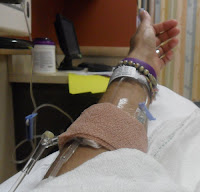One of the major symptoms of my autoimmune diseases is peripheral neuropathy.Peripheral neuopathy describes damage to the peripheral nervous system. This is the communication network that transmits information from the brain and spinal cord (the Central Nervous System or CNS) to every other part of the body. They also send sensory information back to the brain and spinal cord, such as a message that your feet are cold or your finger is getting burned. Damage to the peripheral nervous system interferes with these vital connections. Much like static on a telephone line, peripheral neuropathy interrupts messages between the brain and the rest of the body.
Because every peripheral nerve has a highly specialized function in a specific part of the body, a number symptoms can occur when nerves are damaged. Some people may experience temporary numbness, tingling, and pricking sensations (paresthesia), sensitivity to touch, or muscle weakness. Others may suffer more extreme symptoms, including burning pain (especially at night), muscle wasting, paralysis, or organ or gland dysfunction. People may become unable to digest food easily, maintain safe levels of blood pressure, sweat normally, or experience normal sexual function. In the most extreme cases, breathing may become difficult or organ failure may occur. Regrettably, I am one of those extreme cases.
So, why did I give you this brief lesson in peripheral neuropathy? Because every other Monday I am admitted into the University of Minnesota's Infusion Specialty Clinic for six hours of Intravenous Immunoglobulin (IVIg) therapy to help control the peripheral neuropathy that is caused by my autoimmune diseases.

|
| Specialty Infusion and Procedure Center |
The Specialty Infusion and Procedure Center is a brand new department located on the second floor of the Phillips Wagensteen Building on the University of Minnesota Medical Center Campus. Prior to this new facility I received my IVIg either in the hospital or in the Masonic Cancer Center. Both very good locations, but unfortunately not large enough for the growing populations of people needing infusion therapies.
The SIPC a beautiful, state of the art facility completely designed to meet the needs of the infusion patient. Offering both rooms with recliners and hospital beds, it is comfortable, quiet and fully staffed with nurses specialized in the administration of the many varieties of infusion therapy. This fact alone makes my bi-weekly visits much easier to tolerate. In a hospital setting nurses are presented with an almost unlimited array of patient/illness circumstances. This is even more evident when being hospitalized for autoimmune diseases - no one really knows where to "put" you. Most likely, depending on what part of one's body is being affected, that is where one ends up. For instance, if I am having trouble with my pancreas, I end up on the 7th floor in the GI department. If I am having trouble with my nervous system, I end up on the 6th floor in neurology. There is no floor for autoimmune diseases.
By having the specialty infusion center available to me, I avoid much of the suffering that comes with having nurses that are not specifically trained in IV therapy. IV's go in easier, infusion rates are better managed and overall "tricks of the trade" offer comfort and ward off potential problems. Being in a smaller more intimate setting also allows the opportunity to establish relationships with the nurses. With the risk of serious allergic reaction a very real possibility, it benefits me to have a nurse that knows my body almost better than I do.

|
|
|
About four hours into the therapy I gradually start to wake up. This begins the "not so fun" part of the IVIg experience. Even with the administration of the pre-medications, I still experience allergic reaction to some degree. At times this can be quite minor - lower back discomfort, mild headache and low grade fever. Other times, I suffer from flu-like symptoms - body aches, fever, chills and nausea. Two times now I have had a serious reaction which has ended up with a week long stay in the hospital. These symptoms are much like those of infectious meningitis and are completely disabling.
Tomorrow is my IVIg Monday. I've been asked by family and friends if I dread when this day comes. Honestly, I really do not. There are so many people out there suffering from autoimmune diseases that do not have access to good health care. Many have doctors that refuse to give them appropriate diagnosis to receive the correct care, others have doctors that remain uneducated in the latest types of treatment. And even those with access to quality providers run into issues of insurance authorization (IVIg can cost up to $45,000 per treatment) or no insurance at all. I have been quite blessed in this regard. Not one second goes by that I am not thankful for the insurance I have, the doctors that treat me or the facilities in which I receive care.
So, unlike the song by The Mama's And The Papas, when Monday comes you won't find me "crying all of the time". Instead, the next time you think of me sitting in my recliner on the second floor of the PWB...don't feel bad. Know that I am in good hands and most likely dreaming of all the wonderful days to come!
Peace to you.


11 comments:
Your amazing attitude always makes me cry when I read what's going on. Have you considered writing a book? You seem to write so well. Not sure an exact focus, but related to what your going through.
Wow, thank you Chris for such a nice comment. Yes, I have thought about writing a book. In fact, you are not the first to mention it. But you are also correct in your wondering....what would the focus be?? That is the very thing that I have not been able to grab onto. I've got about five different directions that I go in and narrowing them down is really hard. Much like this blog! I'm just thankful that my readers thus far have not minded my random style!
SO glad to hear from you!
Praying for you today!
Thank you! Things went fairly well yesterday. Today is my typical "flu" day, so I'll be taking it pretty easy. A good day to nap and pet the dogs!
I have been reading back through all your days and see so much of my struggles and realizations in your story.
You write so very well, I am not so good at that.
Thanks for doing your blog you it will not only help other lupus patients to know they aren't alone or what things to expect but you also help spread awareness to people who are not affected by lupus.
debbie ( from it's lupus now what fb group.)
Debbie!!
I can not even begin to count all the times you helped me when I was first diagnosed. YOU were my one voice I could turn to without fail. Always positive, always with the information I needed and always willing to help. Any time I browsed the discussions I looked for your name when looking for responses. I just knew I could trust your advice. I remember one time when I was undecided about if I should go into the ER or not (heart troubles) - you spoke some pretty tough words to me. They were hard to hear - but they were EXACTLY what I needed to hear.
I'm so glad we are on this journey together. Thank you for your comment - and thank you for all YOU do!!
Theresa, I would read your blog even if your writing rambled aimlessly. Keep in mind it is as healing to the (absent) reader as it is to you to write it. In other words, it makes the distance disappear and makes us feel as if we were by your side when we can't be. Your writing shows your amazing positive attitude through all these things many would just throw in the towel over. Love you!
Merrideth, thank you so much.
I had the opportunity to hear a Holocaust survivor speak the other day - an amazing older gentlemen with so many wise things to say. He survived things that we can't even imagine and yet he came out this beautiful compassionate man - spent his life as a pediatrician in service to others. He ended his talk with these words...
"Valuables are not what we keep in the bank. Valuables are the memories we deposit into the hearts and minds of others."
I could only be so fortunate as to hope for the very same thing from my own suffering.
I miss you dear friend - so much.
Theresa, I am in awe of your ability to write about this experience! Thank you so much for sharing. I have RA and for about five years I had to have my medicine through infusion, and the process was always a pain. I've had my infusions in a number of different places - some have been fantastic (like my rheumatologist's office. He had a nurse that was there specifically for infusions and she was an angel! It was small and she was the best. So far also the best at starting the IV.) and some have been awful (the Cancer Center in Utah.) but all have been very personal experiences. (If that makes sense!) And something so many people don't realize what it takes to go through.
I can't compare my infusions to yours, as what you go through sounds like an extreme of my experiences, but it's comforting to see someone else who goes through something even more difficult and is living a happy life and dealing with it just fine! My aunt has Lupus and I always wonder how she gets by - I wish I had her strength!
All in all, I love your blog. It's a very real look at what having an auto-immune disease is like. I don't have very many people in my life that I can go to who understands what I go through, so I'm learning to connect through the internet. Thank you for opening your blog to me!
Lyda
Lyda - you are so very welcome. And you are right, it is a very personal experience - some good, some not so good. I've been doing this a couple of years now and have done the home infusion thing administered through home health care, cancer centers and just plain old checked into the hospital. I've pretty much been all over the Twin Cities, having different places "fit me in" when it's been more emergent. It's something not many people understand, so you are right - it is absolutely a gift to be able to connect via the web with support systems. And when it comes to the one on one - like we have here - that's priceless. So thank you for your comments and know that this deal goes both ways, for sure! Another exciting part of the journey to look forward to!
Be well,
Theresa
Over time, diabetes may cause nerve damage, also called diabetic neuropathy, that can cause tingling and pain, and can make you lose feeling in your feet. When you lose feeling in your feet, you may not feel a pebble inside your sock or a blister on your foot, which can lead to cuts and sores. Cuts and sores can become infected.
Diabetes also can lower the amount of blood flow in your feet. Not having enough blood flowing to your legs and feet can make it hard for a sore or an infection to heal. Sometimes, a bad infection never heals. The infection might lead to gangrene.destructeur diabète and Maitrisez Votre Diabete
Post a Comment